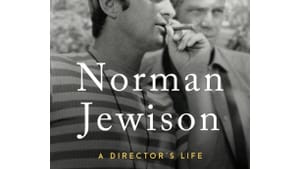Stay in the Loop
BSR publishes on a weekly schedule, with an email newsletter every Wednesday and Thursday morning. There’s no paywall, and subscribing is always free.
Jewison finally gets his due
‘Norman Jewison: A Director’s Life’ by Ira Wells

When it comes to movie directors from the 20th century with a prolific body of beloved films, Norman Jewison is right up there. In his new book, Norman Jewison: A Director’s Life, Ira Wells chronicles that career. Jewison directed 24 movies across five decades, from his debut in 1962 to his last film, in 2003. His work included such important films as In the Heat of the Night, the original The Thomas Crown Affair, Fiddler on the Roof, Jesus Christ Superstar, Rollerball, and Moonstruck.
But these days Jewison is also less of a household name than many of his contemporaries. He never really emerged as a famous personality or ubiquitous media figure, and while his career straddled numerous eras, he wasn't really part of any clique or coterie of directors that emerged in the '60s, '70s, or '80s. While his movies are much loved, Jewison wasn't exactly a pure auteur, and his work doesn't get talked about in the same reverent tones as that of Stanley Kubrick, Martin Scorsese, or Steven Spielberg.
"They are these giant figures in the industry," the late screenwriter William Goldman says in the book of Jewison, Sidney Lumet, and Walter Hill. "They could walk down any street, in any city in the world, and no one would know who they were."
Film after film
Wells is a professor at the University of Toronto, Jewison’s alma mater, and the biographer takes us through Jewison’s life and career, telling the backstories of each of his films—and even a few that he worked on but never made.
Whether Jewison cooperated with this book is kind of a complicated question. It appears the author spoke briefly with the subject, who at the time was 93 years old, while hosting him at the university in the fall of 2019. But Wells did have extensive access to Jewison's personal archives, and much is reported about his correspondence with various collaborators, in top of what's gleaned from dozens of interviews.
A nearly instant success after getting his start in television, Jewison soon began making film after film after film, seemingly always having the next set to go once he completed one. Jewison directed a movie a year between 1962 and 1969, including two in 1965, and nearly kept up that pace in the '70s. Jewison, who will celebrate his 95th birthday in July, received an honorary Oscar (the Irving G. Thalberg Memorial Award) in 1999, and at the end of that year, his movie The Hurricane, with Denzel Washington, was the last film release of the 20th century.
The ones that got away
As told in the book, the stories of the films are fascinating, but nearly as intriguing are the stories of the movies that Jewison wanted to make but didn't. Intriguingly, he was once considered to direct the movie of William Goldman's The Princess Bride (a distinction that ultimately went to Rob Reiner).
Jewison sought to make a movie about Nat Turner in the 1970s and an adaptation of The Autobiography of Malcolm X in the early 1990s. But following backlash about a white director making them, neither movie went ahead. (Spike Lee, the leader of the outcry against Jewison's making the Malcolm X biopic, ended up making it himself, in 1992.) Those episodes show that recent controversies about cultural appropriation are not new.
Jewison, the gentile
No, Norman Jewison isn't Jewish, although thanks to his surname he's been mistaken for a Jew for his entire life, and has been a lifelong philo-Semite.
Despite being a secular Protestant from Canada, Jewison directed the single most beloved American movie musicals associated with both Judaism (Fiddler on the Roof) and Christianity (Jesus Christ Superstar), and did so within a single three-year stretch. The book leaves out the great anecdote, told by the director in the 2018 documentary Fiddler: Miracle of Miracles, about the time Jewison had to sit down with the producer of the Fiddler movie and let him know that he wasn't Jewish.
But the book does go into the bizarre episode when the movie Jesus Christ Superstar was widely, and baselessly, accused of anti-Semitism. It was similar to what would follow 30 years later with Mel Gibson's The Passion of the Christ, although in Jewison's case, unlike Gibson, he never vindicated his critics by spewing anti-Jewish invective.
Ready to rewatch
If you're looking for Hollywood gossip from the past, this book isn't for you. It's very light on detail about the director's personal life, aside from his long marriage to his first wife, the chronology of his children's births, and Jewison's decisions to move from Canada to Los Angeles and later to London. Instead, Wells concentrates on the director’s body of work, giving this fine filmmaker his due. It's the kind of book that's going to inspire anyone reading it to go back and watch one, two, or 10 of the movies.
Image description: The cover of Norman Jewison: A Director’s Life. It has the title in large white text, over a black-and-white photo of the director as a young man, smoking a cigar and looking intently out of the frame.
What, When, Where
Norman Jewison: A Director’s Life. By Ira Wells. Toronto: Sutherland House Books, May 18, 2021. 480 pages, hardcover; $26.63. Get it on Bookshop.org.
Sign up for our newsletter
All of the week's new articles, all in one place. Sign up for the free weekly BSR newsletters, and don't miss a conversation.

 Stephen Silver
Stephen Silver